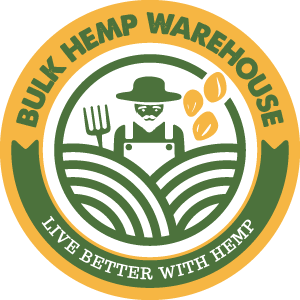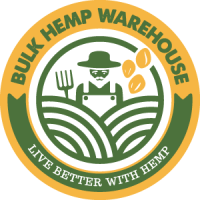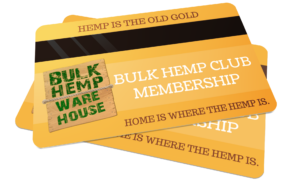
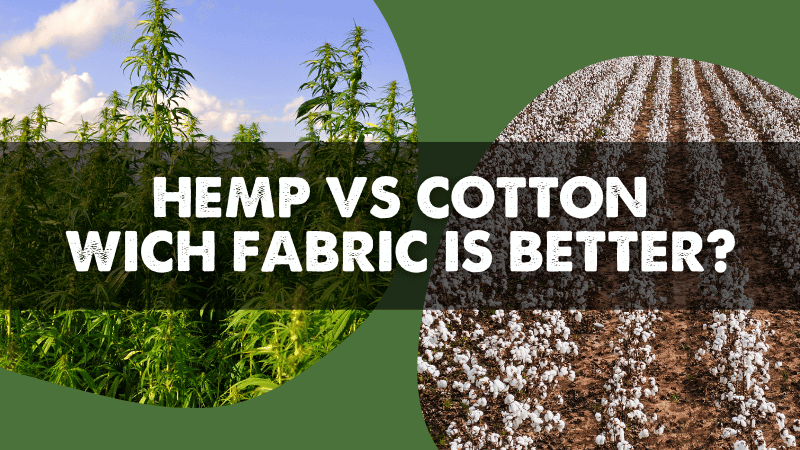
- Author Tyler Hoff
- Categories: Hemp Benefits, Hemp Education, Hemp Fabric, Hemp Fibers, Hemp Uses
Hemp vs Cotton: Which Fabric is Better?
Are you trying to find the best fabric between hemp vs cotton, which is comfortable and eco-friendly and hence causes less harm to the environment?
There is sufficient evidence that human activities like burning fossil fuels hurt the environment. And when it comes to cotton farming it’s one of the most toxic agricultural crops.
Cotton is one of the most Genetically Modified plants, and when made into a GMO it requires tons or pesticides, herbicides and fungicides to help it survive.
And guess what happens to all of those toxic chemicals?
They go into our waterways, soil, and ultimately into our bodies after being made into different types of fabrics.
It has made people eco-conscious to start utilizing products that impact the environment positively. Thus, interest in hemp vs. cotton and which is the better fabric is increasing daily.
There are half-truths and misinformation on the hemp vs. cotton debate.
In this post, we will discern fact from fiction. Find out their main differences, how they affect the environment, and which fabric is better for you.
A Brief History of Hemp
This versatile and sustainable plant has been part of human civilization since 8000 BC.
It was food (hemp seeds),used in construction materials, made into ropes and used for paper production.
Hemp eventually made its way into North America and was for food and textiles.
But in the early 20th century, it was stigmatized, and the Marihuana Tax Act of 1937 criminalized marijuana, and unfortunately included hemp.
This demonization and regulation led to hemp’s decline, but there was a resurgence during World War II, as it was utilized for making military gear like parachutes.
Despite aiding in the war effort, hemp fell out of favor again, thanks to its major competition from the cotton, lumbar, pharmaceutical and petrochemical industries.
A research review highlighted that, from the 5th century BC up to the stage of the Industrial Revolution, hemp fabrics were in about 90% of production of sails on ships.
Until the United States of America introduced the so-called Marihuana Tax Act (1937), which included industrial hemp, about 80% of all fabrics intended for clothes and other everyday textile products were made of hemp.
It was not until the 2018 Farm Bill that legalized the cultivation of industrial hemp that there was a resurgence and interest in hemp.
It’s partly due to more people learning about the benefits of hemp for the environment.
Hemp vs. Cotton: The Main Differences
Durability and Longevity
Hemp is known for its durability, while cotton wears out with each wash. Therefore, the more you wash it, expect cotton to be thinner and more susceptible to wear and tear.
Hemp’s durability and strength are one of the main reasons it’s in construction and hemp rope production.
Also, expect products made from hemp to outlast the competition because repeated washes do not affect it like cotton.
Therefore, when you have hemp clothing, it’s strong and stretches less.
But compared to cotton clothing, which breaks down with ease.
The consumer has to purchase more cotton fabric like t-shirts or socks.
Hence, on average, hemp fabrics can last an impressive 30 years, outlasting cotton fabrics, which typically have a lifespan of around ten (10) years.
Investing in hemp-made textiles ensures longevity and sustainability for your wardrobe or home furnishings.
Not to mention, it’s way better for your health, not being constantly exposed to GMOs and pesticides, seeping into your skin and bloodstream.
The Breathability & Comfortability of Hemp over Cotton
Cotton is the most abundant and utilized fabric because it is generally softer and more comfortable than hemp.
However, hemp does become comfortable over time with each wash. And you can do a lot to soften hemp and make finer fibers to create a more comfortable feel.
So, in terms of breathability, both hemp and cotton are ideal, but hemp is more breathable than cotton.
It’s because cotton retains moisture. Hence, it’s uncomfortable to wear during hot and humid conditions.
Hemp, on the other hand, efficiently whisks away moisture from perspiring skin, but it also boasts natural antibacterial properties that combat unpleasant body odors.
Therefore, when you have cotton fabric that retains moisture, it’s more susceptible to mildew and fungi or mold growing.
Thus, stay fresh and confident the whole day by utilizing hemp clothing’s remarkable benefits.
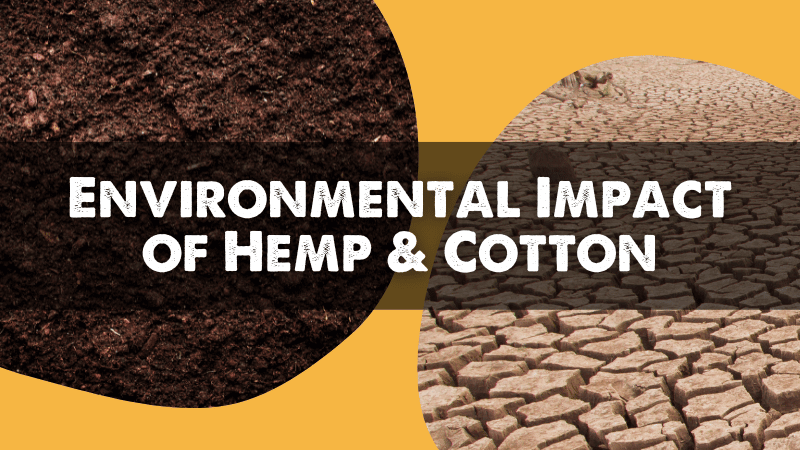
Environmental Impact of Hemp & Cotton
Pesticide Use in Hemp vs. Cotton
Although cotton is a natural product, its reliance on pesticides is a big reason too many opt for hemp.
For instance, the year 2000 had 84 million pounds of pesticides applied to the nation’s 14.4 million acres of cotton. And more than two (2) billion pounds of fertilizers were spread on those fields.
Also, it’s believed that for every nine (9) ounces of cotton—the amount in an average T-shirt—growers use an average of 17 teaspoons of chemical fertilizers.
Globally, cotton production uses $2 billion worth of pesticides yearly and accounts for 16% of global insecticide use – more than any other single crop – which has led to cotton being called the world’s ‘dirtiest’ agricultural commodity.
This extensive pesticide usage will harm the soil and environment that is contaminated rivers,streams and other waterways.
As for hemp, it’s a self-supporting and resilient plant.
Therefore, it can thrive without the need for harmful pesticides, herbicides and toxic fertilizers.
So you can bank on your hemp products being environmentally friendly.
Hemp does not rely on pesticides for growth & higher yields
Hemp is, therefore, a better alternative for a sustainable future when compared to cotton.Water Consumption of Hemp vs. Cotton
According to the World Wildlife Fund (WWF), 713 gallons (2,700 liters) of water is necessary when producing a single cotton t-shirt. That’s enough to sustain one (1) person for 900 days.
Therefore, cotton uses lots of water for growth, and in countries like India, where water is scarce, cotton farming has led to the depletion of water resources.
Hemp consumes significantly less water compared to cotton. It’s believed that with just 300-500 liters of water, you can efficiently produce a kilogram of dry hemp.
This eco-friendly alternative requires significantly less water, making it a sustainable choice for environmentally conscious individuals and businesses.
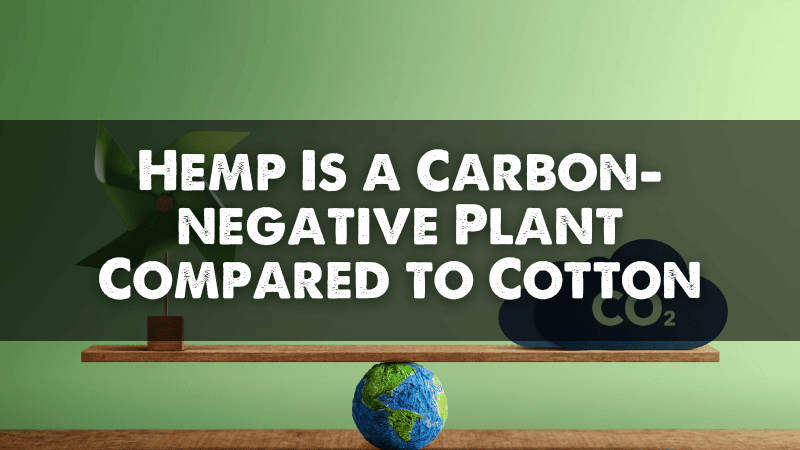
Hemp Is a Carbon-negative Plant Compared to Cotton
Hemp absorbs more CO2 than it produces because it uses fewer pesticides. So it won’t emit toxins into the soil and environment.
Therefore, you will have soil quality improved.
Thus, hemp will remove approximately 1.63 tons of carbon dioxide from the atmosphere. And cotton farming does the opposite, which is to cause CO2 emissions.
A review paper stated that the estimated global consumption of cotton releases around 220 million tonnes of CO2.
Hence, hemp's environmental benefits are myriad & viable in combating environmental pollution and reducing greenhouse gas emissions
Hemp requires less land compared to cotton. Hemp plants are tall and slender.
Therefore, they’re planted close together and use less land. Cotton plants require adequate spacing, so more land space is utilized. Hence, a acre of hemp will produce more yields when compared to cotton.
For example, hemp can produce an impressive 1200-2000 kilos of fiber, while cotton only yields 300-1100 kilos.
Also, hemp fiber produced is 200-250% more than cotton in the same land size. Therefore, when compared to cotton, hemp provides a significantly higher fiber volume per unit of land.
Moreover, with less land utilized by hemp, you can plant other crops, resulting in higher yields. But with cotton, you can’t have more plants because of increased land usage.
Also, crop rotation is limited. Hence, you are putting a strain on the environment.
Cotton takes longer to mature, roughly 5-6 months. At the same time, when compared to hemp, it takes 3-4 months.
Therefore, a healthier planet means opting for hemp cultivation.
Biodegradability of Hemp vs. Cotton
Biodegradable materials are usually broken down naturally by microorganisms such as fungi and bacteria. Therefore, between hemp and cotton, are they biodegradable?
Hemp is biodegradable because it’s an organic matter. So, it breaks down naturally.
As for cotton, it is not biodegradable since there is chemical treatment usage.
However, if it were 100% cotton, and grown organically it would be biodegradable.
Unfortunately, this is not usually the case, so hemp is the best alternative fabric due to its eco-friendly nature, once again.
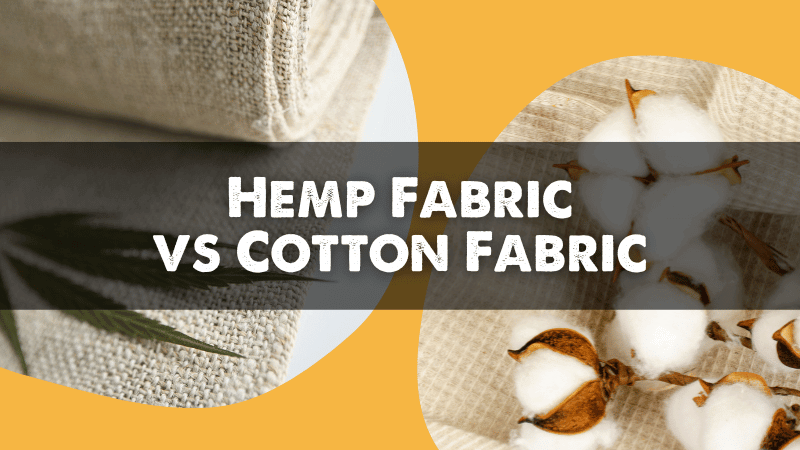
Choose the Ideal Fabric Between Hemp & Cotton
The hemp vs. cotton debate highlights some key differences and environmental impacts of both plants. But as a fabric, will they fulfill your needs and priorities?
Thus, which is the better fabric for you?
Hemp might be the fabric for you if you need it to be durable and sustainable.
It is because hemp is eco-friendly, has less water and pesticide consumption, and is sturdy and strong. So it’s a long-lasting product.
But the cotton fabric is softer against the skin, hence its usage in making items like bathrobes and towels. So, when choosing between hemp and cotton you want, consider your primary concerns and priorities.
Nevertheless, hemp clothing is usually better. It is because it will not wear and tear quite easily. So you’ll have your hemp t-shirts or socks for longer since hemp is stronger.
So, fewer replacements and reduced consumption.
Contrast that to cotton clothing. After each wash, its fabric starts thinning, breaking down over time, and tears easily. So you’ll be looking for a replacement soon.
But one things that’s great about the fabrics we offer, is that we work with some blended fabrics using hemp and organic cotton.
So you get the best of both worlds. The soft, gentle feel of the cotton, combined with the strength and durability of the hemp fibers.
The Conclusion of Hemp vs Cotton
Cotton might be the most popular and well-known fabric, but is it eco-friendly, durable, and strong?
No, hemp is a much better option. It’s because, as opposed to cotton negatively impacting the environment, hemp is a remarkable plant that does offer significant environmental advantages.
Therefore, in the hemp vs. cotton debate, hemp is significantly better than cotton in several ways.
As more people are mindful of how their contribution can lead to a greener and healthier planet, hemp products and cultivation are the best choice.
OTHER EDUCATIONAL HEMP POSTS
Explore Other Posts by Bulk Hemp Warehouse
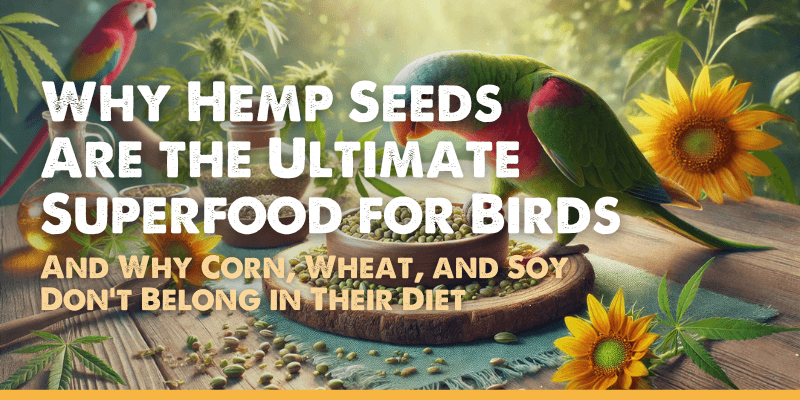
Why Hemp Seeds Are the Ultimate Superfood for Birds – And Why Corn, Wheat, and Soy Don’t Belong in Their Diet
Could hemp seeds be the NEW Bird Feed that beats corn wheat and soy? I think so.
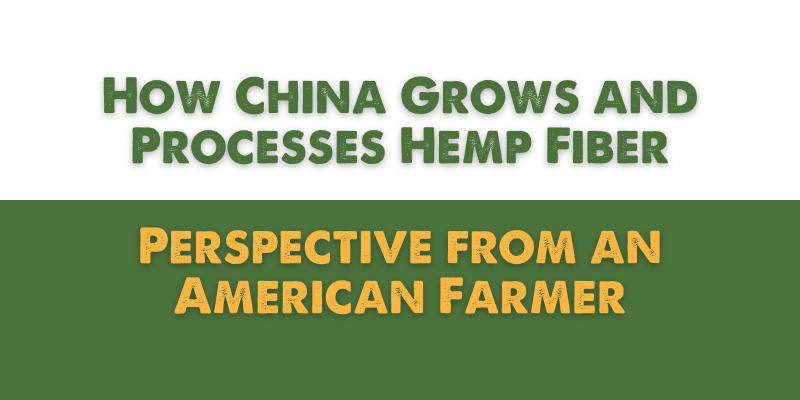
How China Grows and Processes Hemp Fiber – From an American Farmer
Steve Groff, a third-generation farmer from Southeastern Pennsylvania, recently embarked on a transformative journey to China, a trip that has profoundly impacted his perspective on the future of hemp farming and textile production. This wasn’t a casual tourist visit; it

10 Ways to Use Hemp for the Holidays
The holiday season is a time for creativity, warmth, and celebration. Hemp, with its versatility and sustainable nature, offers endless opportunities to make your holiday festivities more eco-friendly and unique. Whether you’re looking for gift ideas, decorations, or a way








